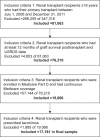Medication therapy management and adherence among US renal transplant recipients
- PMID: 27175070
- PMCID: PMC4854272
- DOI: 10.2147/PPA.S104646
Medication therapy management and adherence among US renal transplant recipients
Abstract
Background: Medication therapy management (MTM) services among patient populations with a range of disease states have improved adherence rates. However, no published studies have examined the impact of Medicare Part D MTM eligibility on renal transplant recipients' (RTRs) immunosuppressant therapy (IST) adherence. This study's purpose was therefore, to determine the effects of Medicare Part D MTM on IST adherence among adult RTRs at 12 months posttransplant.
Methods: Cross-sectional analyses were performed on Medicare Parts A, B, and D claims and transplant follow-up data reported in the United States Renal Data System. The sample included adult RTRs who were transplanted between 2006 and 2011, had graft survival for 12 months, were enrolled in Part D, and were prescribed tacrolimus. IST adherence was measured by medication possession ratio for tacrolimus. MTM eligibility was determined using criteria established by the Centers for Medicare and Medicaid Services. Descriptive statistics were calculated. Adherence was modeled using multiple logistic regression.
Results: In all, 17,181 RTRs were included. The majority of the sample were male (59.1%), and 42% were MTM-eligible. Mean medication possession ratio was 0.91±0.17 (mean ± standard deviation), with 16.83% having a medication possession ratio of <0.80. MTM eligibility, sex, age, and number of prescription drugs were significantly associated with adherence in the full model (P<0.05). MTM-eligible RTRs were more likely to be adherent than those who were not MTM-eligible (odds ratio =1.13, 95% confidence interval 1.02-1.26, P=0.02).
Conclusion: The findings provide evidence that access to MTM services increases IST adherence among RTRs.
Keywords: Medicare Part D; medication adherence; medication therapy management; renal transplant.
Figures
Similar articles
-
Association between Posttransplant Opioid Use and Immunosuppressant Therapy Adherence among Renal Transplant Recipients.Nephron. 2020;144(7):321-330. doi: 10.1159/000507257. Epub 2020 May 20. Nephron. 2020. PMID: 32434210 Free PMC article.
-
Evaluation of Eligibility Criteria Used to Identify Patients for Medication Therapy Management Services: A Retrospective Cohort Study in a Medicare Advantage Part D Population.J Manag Care Spec Pharm. 2016 Jan;22(1):22-30. doi: 10.18553/jmcp.2016.22.1.22. J Manag Care Spec Pharm. 2016. PMID: 27015048 Free PMC article.
-
Immunosuppressant therapy adherence and graft failure among pediatric renal transplant recipients.Am J Transplant. 2009 Nov;9(11):2497-504. doi: 10.1111/j.1600-6143.2009.02793.x. Epub 2009 Aug 14. Am J Transplant. 2009. PMID: 19681814
-
Evolution of the Medicare Part D Medication Therapy Management Program from Inception in 2006 to the Present.Am Health Drug Benefits. 2019 Sep;12(5):243-251. Am Health Drug Benefits. 2019. PMID: 32015791 Free PMC article. Review.
-
Centers for Medicare and Medicaid Services Support for Medication Therapy Management (Enhanced Medication Therapy Management): Testing Strategies for Improving Medication Use Among Beneficiaries Enrolled in Medicare Part D.Clin Geriatr Med. 2017 May;33(2):153-164. doi: 10.1016/j.cger.2017.01.001. Epub 2017 Feb 14. Clin Geriatr Med. 2017. PMID: 28364988 Review.
Cited by
-
Medication Adherence in Adults with Chronic Diseases in Primary Healthcare: A Quality Improvement Project.Nurs Rep. 2024 Jul 17;14(3):1735-1749. doi: 10.3390/nursrep14030129. Nurs Rep. 2024. PMID: 39051365 Free PMC article.
-
Improving medication adherence in adult kidney transplantation (IMAKT): A pilot randomised controlled trial.Sci Rep. 2019 May 22;9(1):7734. doi: 10.1038/s41598-019-44002-y. Sci Rep. 2019. PMID: 31118485 Free PMC article. Clinical Trial.
-
Effect of recipient-donor sex and weight mismatch on graft survival after deceased donor renal transplantation.PLoS One. 2019 Mar 29;14(3):e0214048. doi: 10.1371/journal.pone.0214048. eCollection 2019. PLoS One. 2019. PMID: 30925158 Free PMC article.
-
Sex and gender as predictors for allograft and patient-relevant outcomes after kidney transplantation.Cochrane Database Syst Rev. 2024 Dec 19;12(12):CD014966. doi: 10.1002/14651858.CD014966.pub2. Cochrane Database Syst Rev. 2024. PMID: 39698949
-
Recruiting a representative sample in adherence research-The MALT multisite prospective cohort study experience.Pediatr Transplant. 2017 Dec;21(8):10.1111/petr.13067. doi: 10.1111/petr.13067. Epub 2017 Oct 6. Pediatr Transplant. 2017. PMID: 28984072 Free PMC article.
References
-
- Pinsky BW, Takemoto SK, Lentine KL, Burroughs TE, Schnitzler MA, Salvalaggio PR. Transplant outcomes and economic costs associated with patient noncompliance to immunosuppression. Am J Transplant. 2009;9:2597–2606. - PubMed
-
- Spivey CA, Chisholm-Burns MA, Damadzadeh B, Billheimer D. Determining the effect of immunosuppressant adherence on graft failure risk among renal transplant recipients. Clin Transplant. 2014;28:96–104. - PubMed
-
- Butler JA, Roderick P, Mullee M, Mason JC, Peveler RC. Frequency and impact of nonadherence to immunosuppressants after renal transplantation: a systematic review. Transplantation. 2004;77:769–776. - PubMed
-
- Denhaerynck K, Dobbels F, Cleemput I, et al. Prevalence, consequences, and determinants of nonadherence in adult renal transplant patients: a literature review. Transpl Int. 2005;18:1121–1133. - PubMed
-
- Chisholm MA, Lance CE, Williamson GM, Mulloy LL. Development and validation of an immunosuppressant therapy adherence barrier instrument. Nephrol Dial Transplant. 2005;20:181–188. - PubMed
LinkOut - more resources
Full Text Sources
Other Literature Sources


